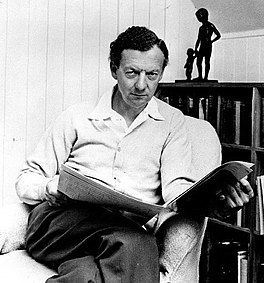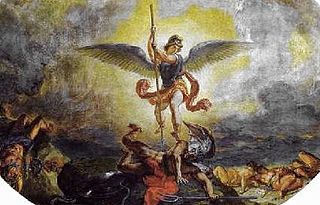Related Research Articles

John Donne was an English poet, scholar, soldier and secretary born into a Catholic family, a remnant of the Catholic Revival, who reluctantly became a cleric in the Church of England. He was Dean of St Paul's Cathedral in London (1621–1631). He is considered the pre-eminent representative of the metaphysical poets. His poetical works are noted for their metaphorical and sensual style and include sonnets, love poems, religious poems, Latin translations, epigrams, elegies, songs, and satires. He is also known for his sermons.

Edward Benjamin Britten, Baron Britten was an English composer, conductor, and pianist. He was a central figure of 20th-century British music, with a range of works including opera, other vocal music, orchestral and chamber pieces. His best-known works include the opera Peter Grimes (1945), the War Requiem (1962) and the orchestral showpiece The Young Person's Guide to the Orchestra (1945).

The War Requiem, Op. 66, is a large-scale setting of the Requiem composed by Benjamin Britten mostly in 1961 and completed in January 1962. The War Requiem was performed for the consecration of the new Coventry Cathedral, which was built after the original fourteenth-century structure was destroyed in a World War II bombing raid. The traditional Latin texts are interspersed, in telling juxtaposition, with extra-liturgical poems by Wilfred Owen, written during World War I.

Sir Peter Neville Luard Pears was an English tenor. His career was closely associated with the composer Benjamin Britten, his personal and professional partner for nearly forty years.

The Serenade for Tenor, Horn and Strings, Op. 31, is a song cycle written in 1943 by English composer Benjamin Britten for tenor accompanied by a solo horn and a small string orchestra. Composed during World War II at the request of the horn player Dennis Brain, it is a setting of a selection of six poems by British poets on the subject of night, including both its calm and its sinister aspects.
Winter Words, Op. 52, is a song cycle for tenor and piano by Benjamin Britten. Written in 1953, it sets eight poems by Thomas Hardy. Winter Words is one of Britten's few compositions from the period after the premiere of his opera Gloriana; its poems are from Hardy's last published collection, having the same title. The cycle was premiered at the Leeds Festival in October 1953, with Peter Pears singing and Britten at the piano. It was dedicated to John and Myfanwy Piper.

The Holy Sonnets—also known as the Divine Meditations or Divine Sonnets—are a series of nineteen poems by the English poet John Donne (1572–1631). The sonnets were first published in 1633—two years after Donne's death. They are written predominantly in the style and form prescribed by Renaissance Italian poet Petrarch (1304–1374) in which the sonnet consisted of two quatrains and a sestet. However, several rhythmic and structural patterns as well as the inclusion of couplets are elements influenced by the sonnet form developed by English poet and playwright William Shakespeare (1564–1616).

Sonnet X, also known by its opening words as "Death Be Not Proud", is a fourteen-line poem, or sonnet, by English poet John Donne (1572–1631), one of the leading figures in the metaphysical poets group of seventeenth-century English literature. Written between February and August 1609, it was first published posthumously in 1633.
A Birthday Hansel, Op. 92, is a song cycle for 'high voice' and harp composed by Benjamin Britten and set to texts by Robert Burns. The last song cycle that Britten wrote, it was composed in honour of the Queen Mother's 75th birthday, at the request of her daughter, Elizabeth II.

The Company of Heaven is a composition for soloists, speakers, choir, timpani, organ, and string orchestra by Benjamin Britten. The title refers to angels, the topic of the work, reflected in texts from the Bible and by poets. The music serves as incidental music for a mostly spoken radio feature which was first heard as a broadcast of the BBC in 1937.

Sophie Adele Wyss was a Swiss soprano who made her career as a concert singer and broadcaster in the UK. She was noted for her performances of French works, many of them new to Britain, for giving the world premieres of Benjamin Britten's orchestral song cycles Our Hunting Fathers (1936) and Les Illuminations (1940), and for encouraging other composers to set English and French texts. Among those who wrote for her were Lennox Berkeley, Arnold Cooke, Roberto Gerhard, Elizabeth Maconchy, Peter Racine Fricker, Alan Rawsthorne and Mátyás Seiber.
Our Hunting Fathers, Op. 8, is an orchestral song-cycle by Benjamin Britten, first performed in 1936. Its text, assembled and partly written by W. H. Auden, with a pacifist slant, puzzled audiences at the premiere, and the work has never achieved the popularity of the composer's later orchestral song-cycles, Les Illuminations, the Serenade for Tenor, Horn and Strings and the Nocturne.
Seven Sonnets of Michelangelo is a song cycle composed by Benjamin Britten (1913–76) for tenor voice and piano in 1940, and published as his Op. 22. It was written for himself and his life-partner, the tenor Peter Pears (1910–86). The manuscripts of the songs are dated between April and October 1940; but there is some evidence that the cycle had been contemplated, and even begun, as early as 1937. It consists of settings of seven sonnets, all love songs, by the Italian painter and poet Michelangelo (1475–1564), in the original language:
- XVI: "Si come nella penna e nell'inchiostro"
- XXXI: "A che più debb'io mai l'intensa voglia"
- XXX: "Veggio co' bei vostri occhi un dolce lume"
- LV: "Tu sa, ch'io so, signor mie, che tu sai"
- XXXVIII: "Rendete agli occhi miei, o fonte o fiume"
- XXXII: "S'un casto amor, s'una pietà superna"
- XXIV: "Spirto ben nato, in cui si specchia e vede"
Songs and Proverbs of William Blake is a song cycle composed by Benjamin Britten (1913–76) in 1965 for baritone voice and piano and published as his Op. 74. The published score states that the words were "selected by Peter Pears" from Proverbs of Hell, Auguries of Innocence and Songs of Experience by William Blake (1757–1827). It was premiered at the Aldeburgh Festival in June 1965 by the German baritone Dietrich Fischer-Dieskau (1925–2012) and the composer. The critic William Mann thought that the cycle would be judged "Britten's deepest and most subtle song-cycle"; and John Warrack wrote in The Daily Telegraph that Britten "has, I feel, here come to terms with the darkness and sense of cruelty that has always stalked his art".
The Poet's Echo is a song cycle composed by Benjamin Britten (1913–76) in August 1965 during a holiday visit to the Soviet Union, in Dilizhan, Armenia. It consists of settings for high voice and piano of six poems by the Russian poet Alexandr Pushkin (1799–1837), in their original language. It was published as his Op. 76.
Sechs Hölderlin-Fragmente is a song cycle for high voice and piano composed in 1958 by Benjamin Britten (1913–76), and published as his Op. 61. It consists of settings of six short poems and verse fragments by the German lyric poet Friedrich Hölderlin (1770–1843).
Who Are These Children? is a song cycle for tenor and piano composed in 1969 by Benjamin Britten (1913–76), and published as his Op. 84. It consists of settings of twelve poems by the Scottish poet William Soutar (1898–1943).
Songs from the Chinese is a song cycle for soprano or tenor and guitar composed in 1957 by Benjamin Britten (1913–76), and published as his Op. 58. It consists of settings of six poems translated from the original Chinese by Arthur Waley (1889–1966). It was written for, and first performed by, the tenor Peter Pears and the guitarist Julian Bream.
Cycle for Declamation is a song cycle for tenor solo composed in 1954 by Priaulx Rainier (1903–86).
References
- ↑ Evans, Peter (1979). The Music of Benjamin Britten. London, Melbourne and Toronto: J. M. Dent & Sons. pp. 349–354. ISBN 0-460-04350-1.
- ↑ Carpenter, Humphrey (1992). Benjamin Britten: A Biography. London: Faber and Faber. pp. 227–228. ISBN 0-571-14324-5.
- ↑ "The Holy Sonnets of John Donne". Britten-Pears Foundation. Retrieved 25 April 2015.
- ↑ Liner notes to CD London 417428-2
- ↑ A performance by Pears on You Tube
- ↑ "The Holy Sonnets of John Donne". recmusic.org. Retrieved 20 April 2015.